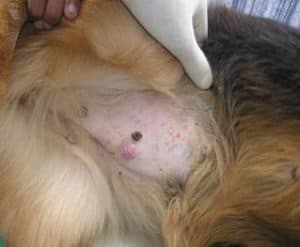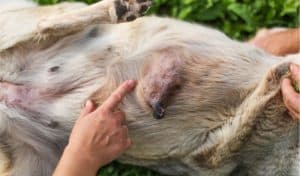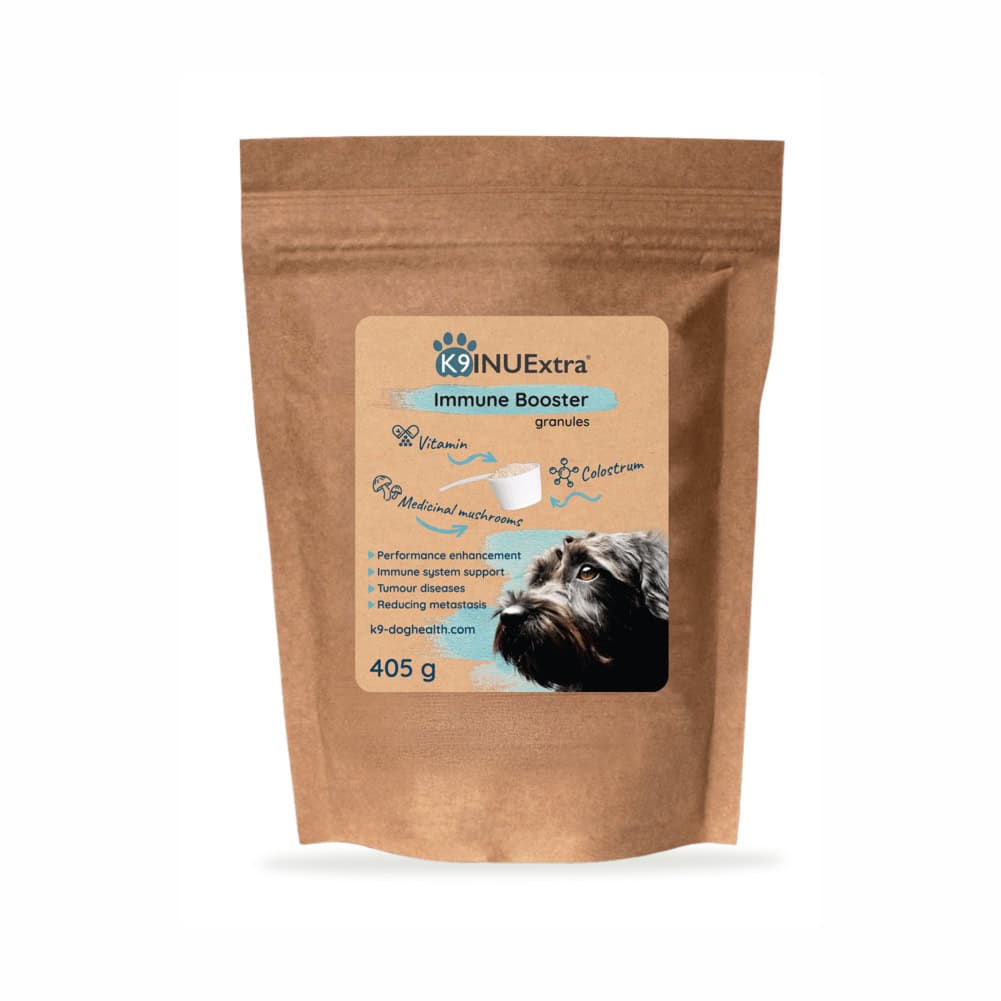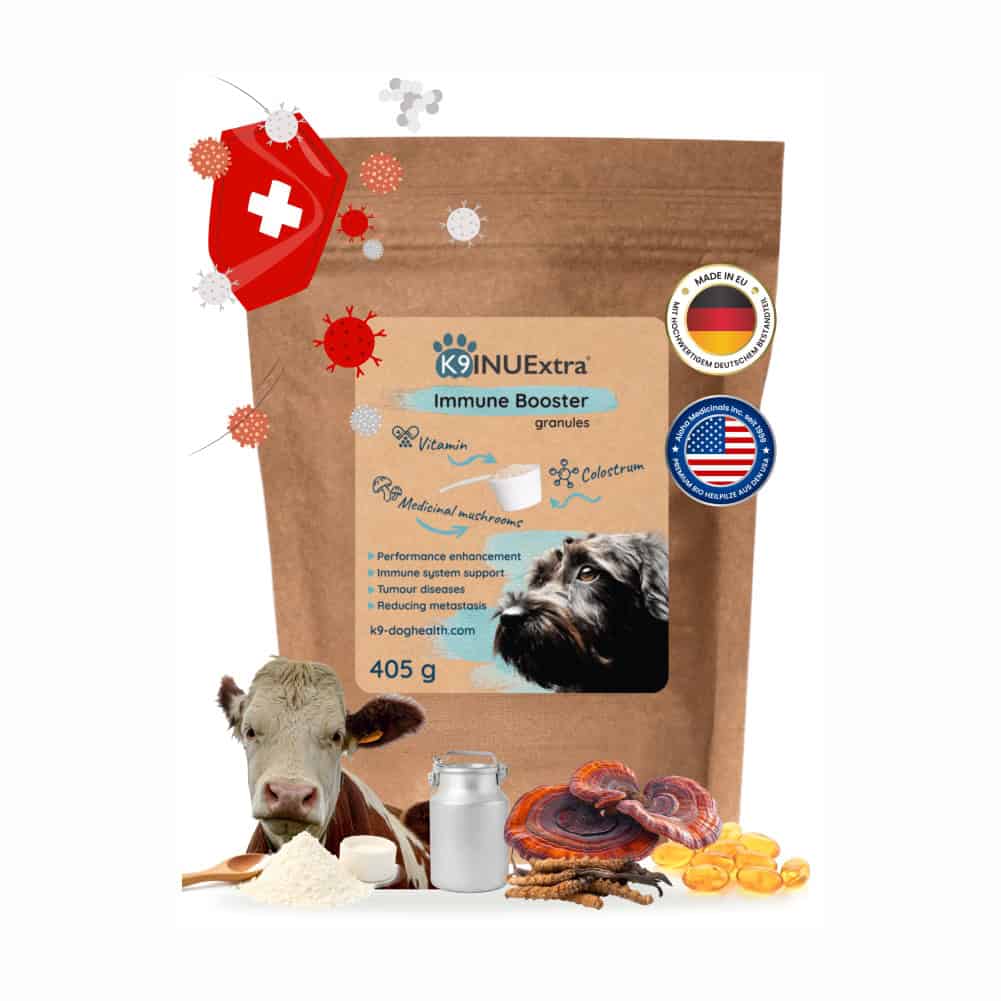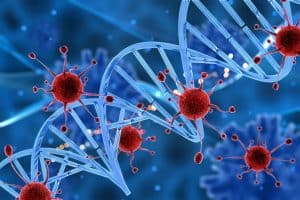Dog mammary tumor – Dogs are by far the most susceptible pets when it comes to mammary tumors. In fact, dogs are several times more likely to develop mammary tumors than women.
Breast tumors account for nearly half of all tumors in female dogs!
Neutering a dog at a young age greatly reduces the risk of developing the disease.
The development of dog mammary tumor
The development of tumors typically requires a combination of factors, so it is almost impossible to know the exact cause of their development. What is certain is that it is much more common in females than in males, but the prognosis is much more severe in males.
Certain dog breeds are genetically more prone to mammary tumors. German shepherd, spaniel, English setter, toy poodle, maltese and Yorkshire terrier breeds are among them.
The mammary tumor develops on average around 10 and a half years of age and is very rare in animals younger than 5 years.
Risk of mammary tumor
The most at risk is the females that is spayed after 2 years of age or not spayed at all. Their mammary tumor incidence is close to 30%. This means that one in three dogs will develop mammary tumors.
Therefore the best prevention is neutering at a young age.
Not to mention, if you don’t want to breed professionally, you can avoid becoming an unwitting breeder!
Here are some statistics:
- The risk of developing a mammary tumor in females castrated before the first firing is 0.5%.
- The rate for those castrated after the first firing is 8%.
- After the second firing, the rate increases dramatically to 26%.
About half of mammary tumor cases are benign, while the other half are malignant.
Symptoms
The most common symptom is slow growing swelling, lumps around the mammary glands. This usually does not cause the dog any pain. Surface sores, ulcers and inflammation may develop around the swellings. Other symptoms may include painful breasts, breast discharge, listlessness, loss of appetite, sudden weight loss, weakness.
Dog mammary tumor treatment
In most cases, surgical removal of the dog mammary tumor is the appropriate treatment. Whether the surgeon removes only the tumor or the surrounding tissue including lymph nodes and mammary gland is influenced by the age of the dog, its condition and the exact type and stage of the tumor.
Chemotherapy may also be needed after surgery if indicated.
Dog mammary tumor aftercare
Most dogs are well the day after surgery. Of course, it is important to give the painkillers and antibiotics prescribed by the doctor and to protect the wound from licking with a protective collar.
After 1 year following the removal of a malignant tumor, it is advisable to take your pet for a check-up at least every 3 months, and every six months thereafter.
Dog mammary tumor and the immunomodulatory therapy
Immunomodulatory therapy consists of two parts:
- to reduce the size of the tumor using traditional methods (surgery, chemotherapy, radiotherapy),
- activate the immune system, make it recognise the tumor cell and trigger an appropriate immune response.
Surgery and chemotherapy are effective in removing most of the tumor, but this is only half of the healing process. These interventions do not cure the cancer, they do not correct the immune system dysfunction that allowed the tumor cells to develop.
However, when surgical intervention and chemotherapy are used to remove the bulk of the tumor cells that are burdening the body, along with immunomodulatory therapy (K9 Immunity™ and K9 Immunity Plus™) to trigger the body’s own line of defence, the immune system, the chances of the dog beating the tumor and living a normal lifespan are excellent.
Strengthening the immune system is essential in cancer (Lymphoma, Osteosarcoma, Mastocytoma, Hemangiosarcoma in dogs, Dog mammary tumor etc.) and against any other disease resulting from an immune disorder! As long as the body does not react to the disease on its own, there is no real healing, only symptomatic treatment.
You can find further information here about the correlation between dog cancer and medicinal mushrooms.
The vet usually says, rightly, that the only thing can be done to prolong the life of the dog, but the tumor is still there. Surgery and radiotherapy are essential to remove the tumor that has already developed, but it takes the body’s own strength to beat the disease.
In addition to veterinary treatments, it is crucial to place great emphasis on strengthening the immune system!
More about dog cancers
